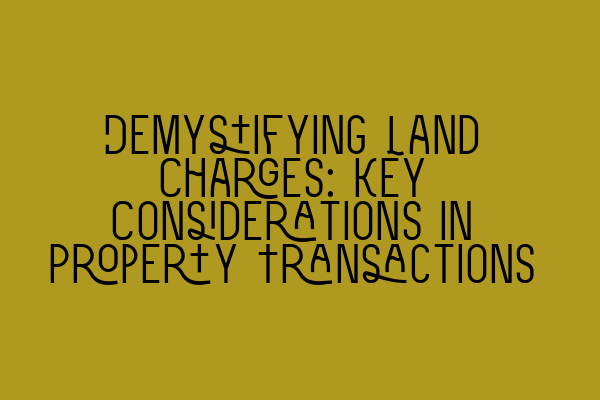Demystifying Land Charges: Key Considerations in Property Transactions
When it comes to property transactions, understanding the concept of land charges is crucial. Land charges are legal encumbrances or restrictions that are registered against a property. These charges can affect the ownership and use of the property, and failing to properly consider them can lead to a host of complications and legal issues.
In this blog post, we will demystify land charges by discussing their key considerations in property transactions. We will explore the various types of land charges, their impact on property ownership, and the importance of conducting thorough due diligence before completing a transaction.
Types of Land Charges
Before we delve into the details, let’s take a closer look at the different types of land charges commonly encountered in property transactions:
1. Restrictive Covenants: These are agreements between property owners that restrict the use of land for specific purposes. They can prohibit certain activities or impose obligations on the property owner. It’s crucial to identify and understand any restrictive covenants attached to a property to ensure compliance.
2. Mortgages: A mortgage is a legal charge against a property that provides security for a loan. Lenders have a legal interest in the property until the mortgage is repaid in full. Understanding the terms and conditions of any existing mortgages is essential, as they may restrict the ability to sell or develop the property.
3. Easements: Easements grant certain rights to third parties to use or access a property. For example, a right of way easement allows someone to pass through another person’s land. Identifying and understanding any easements affecting a property is crucial to avoid potential disputes or limitations on use.
4. Local Land Charges: These are charges registered against a property by local authorities. They typically include planning permissions, building regulations, and enforcement notices. Checking the local land charges register is essential to ensure compliance with local requirements and regulations.
5. Charges by Statute: Various statutes create specific charges that can affect a property. For instance, the Landlord and Tenant Act 1954 grants lease renewal rights to business tenants. Understanding the implications of statutory charges is crucial to avoid legal complications.
Impact on Property Ownership
Land charges can have a significant impact on property ownership. They can limit the owner’s rights and impose obligations on them. Restrictive covenants, for example, can restrict the type of building that can be erected on the property or the use of the land for specific purposes.
Mortgages can also affect property ownership. If a property has an existing mortgage, the lender holds a legal interest in the property until the debt is repaid. It’s crucial to ensure that all necessary steps are taken to discharge the mortgage upon repayment to avoid any issues in the future.
Easements, such as rights of way, can also impact property ownership. It’s important to understand the extent of any easements and how they may affect the property’s value or use. Failure to address easements properly can result in disputes or limitations on the property’s development.
Conducting Due Diligence
Given the potential implications of land charges on property transactions, thorough due diligence is vital. Here are some key steps to consider during the due diligence process:
1. Land Registry Search: Conduct a search of the property on the Land Registry website to obtain the title register and title plan. These documents will provide vital information about any registered land charges affecting the property.
2. Local Authority Search: Instruct a local authority search to uncover any local land charges, planning permissions, or enforcement notices that may affect the property. This search is crucial for ensuring compliance with local regulations.
3. Review of Title Documents: Carefully review the title documents, including the title register and title plan, to identify any restrictive covenants, mortgages, or easements attached to the property. Seek legal advice if necessary to fully understand the implications.
4. Obtain Legal Advice: Engage a solicitor specializing in property law to review the search results, assess any potential risks or issues, and guide you through the transaction. Their expertise will ensure you are fully aware of all land charges and can make informed decisions.
In conclusion, understanding and addressing land charges is essential in property transactions. Failing to properly consider these charges can lead to legal complications, disputes, and restrictions on property use. By conducting thorough due diligence and seeking professional advice, you can navigate the intricacies of land charges and ensure a smooth transaction.
For more resources and information on the SQE exams and legal education, check out the following articles:
– SQE 1 Practice Exam Questions: Test your knowledge and prepare for the SQE 1 exam with these practice questions.
– SQE 1 Practice Mocks FLK1 FLK2: Get hands-on practice with the SQE 1 exam format using these mock tests.
– SQE 2 Preparation Courses: Enhance your skills and knowledge for the SQE 2 exam with specialized preparation courses.
– SQE 1 Preparation Courses: Prepare for the SQE 1 exam with comprehensive courses designed to cover all topics.
– SRA SQE Exam Dates: Stay up-to-date with the latest SQE exam dates and deadlines set by the Solicitors Regulation Authority.
Remember, when it comes to property transactions and land charges, knowledge is power. Arm yourself with the right information and expert advice to make informed decisions and safeguard your interests.
